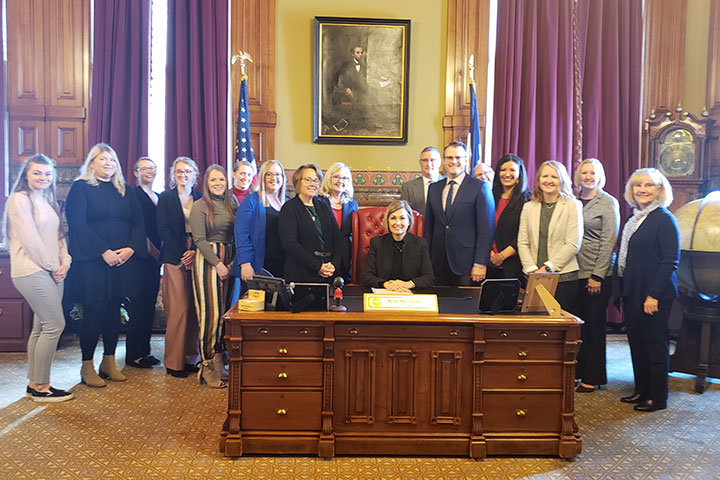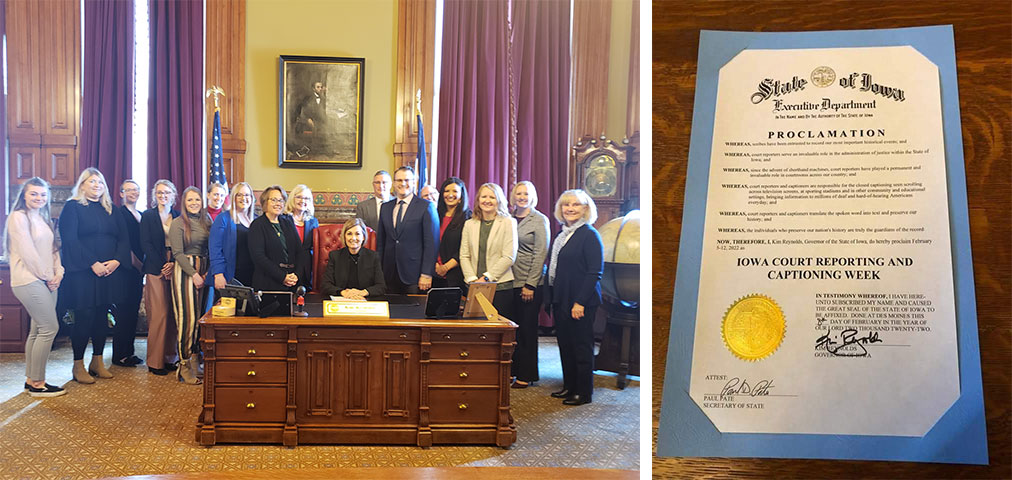Realtime Court Reporting Program

Right Column Top
For more information, contact:
DMACC Newton Campus
newton@dmacc.edu
641-791-3622
Right Column Bottom
Completion Options
Campus: Newton

Latest News
National Court Reporting Week 2022

Iowa Governor Kim Reynolds and Lieutenant Governor Adam Gregg are joined by DMACC-Newton Provost Dr. Joe DeHart, court reporting faculty members Cathy Penniston and Patti Ziegler, DMACC court reporting students, and members of the Iowa Court Reporters Association for the signing of the Iowa Proclamation for Court Reporting and Captioning Week. February 2022.
Facts About DMACC’s Virtual Court Reporting Program
- This is a full-time, day-time program.
- LIVE virtual instruction is delivered through Canvas, Zoom or Microsoft Teams. These classes are synchronous, and attendance is required. Most classes meet from 8 a.m. to 2 p.m. Monday through Thursday.
- Students are required to come to the DMACC Newton Campus 4-6 days each semester.
- Professors are highly qualified and caring, with many years of experience in court reporting, captioning and teaching.
- Classes are designed for completion in two years.
- The job market is very strong; court reporters are in high demand in Iowa and nationwide.
- Mentor and internship opportunities are offered with the Iowa Court Reporters Association.
- DMACC’s virtual program is approved by the National Court Reporters Association (NCRA). DMACC is a nationally accredited college (Higher Learning Commission).
Court Reporting
Put yourself in the center of fascinating events, discussions and judicial proceedings with a realtime DMACC Court Reporter Degree: the person entrusted with making an accurate, verbatim record of everything spoken in the courtroom. In America's judicial system, court reporters are indispensable. They are the eyes and ears of the courtroom while reporting the official record.
Most judicial proceedings cannot start without a court reporter present, because in the judicial world, if it's not in “the record,” it didn't happen.
The work of realtime court reporters isn't limited to the judicial system. These trained professionals may use their skills to pursue a growing number of options.
Some examples include:
- Captioning
- Realtime Broadcast Captioning
- Depositions
- Conferences & Conventions
- Important Meetings
- Legal and Medical Transcription
- Educational and Business CART (Communication Access Realtime Translation)
Why should you consider a career in court reporting?
How to get started?
-
Apply to DMACC today. No application fees and you can apply online.
-
Need money? Visit DMACC's Financial Aid website to learn more about how to fund your education.
Page Content